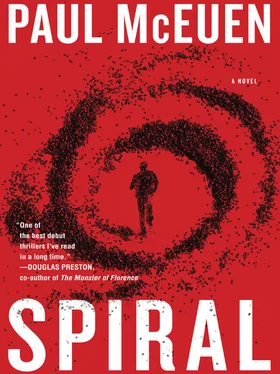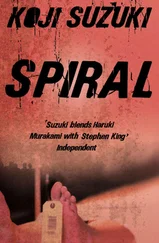“Shooting at rocks.”
“Why?”
“Rocks don’t shoot back.”
Vlad tapped Jake on the shoulder. “Okay, slow down. There.”
JAKE PARKED BEHIND A BRAND-NEW JET-BLACK CADILLAC Escalade, and they started up the walk. Uncut weeds poked up between the stepping stones. At first glance, Harpo’s place blended in with the rest. The yard was full of junk like all the others, but this junkyard was more of a high-tech graveyard. Computer servers. Broken monitors. Various things Jake couldn’t identify for sure, but they looked like burned-out versions of what he saw in bio labs: centrifuges, hot plates, PCR cyclers. There was even a DNA synthesizer.
“We don’t tell him anything about why we want this,” Jake said. “We agree?”
“Don’t worry. He will not ask.”
The door to the house was new, with the flat brown paneling that Jake recognized as the vinyl covering of a reinforced steel door. There were two dead bolts in addition to the knob, and a small security camera above the door encased in a little black cage.
The front door opened before they could knock. A big man stood there, maybe six-three, two-fifty. Thick through the waist and even thicker through the chest. He wore sweatpants, orange Crocs on his feet, and a T-shirt advertising a Cambridge bar called the Plough & Stars. He had a Snickers bar in his hand.
It wasn’t hard to see where he got the name Harpo. On his head was a shock of curly white hair, almost like a fright wig. “This Jake?” he said to Vlad. “The Crawler guy?”
“He is the one.”
He welcomed them in, gregarious and open, a contrast to all the security measures. He threw an arm around Jake. “I love your little robots, would kill to get my hands on a few. You might sell me some? Been trying to pry some loose from Boris Badenov here,” he said with a glance at Vlad, “but he ain’t biting.” He let go of Jake, turned serious. “Think about it. I could make you good money—two hundred bucks apiece, easy. Conversation pieces for technophiles. You teach it to dance the Macarena to an MP3, I bet we could get five times that. What do you say? You interested?”
Jake passed, a bit too gruffly. He was already antsy. He just wanted to get the DNA sequenced and get back to Maggie.
Harpo took it gracefully. “Come on.”
The interior of Harpo’s house was a total contrast to the outside. The living room was well lit and relatively clean but completely devoid of furniture. Instead it was full of computer servers, most of them dark. “You want an HP BladeSystem c7000?” Harpo said, patting one of the silent server stacks. “I’ll sell it to you cheap. Got no use for them now. I ran a data-mining service for a while. We generated customer profiles based on Web surfing patterns, but now everyone’s gotten into that game. You want easy pickings, you gotta be in at the beginning. Selling something no one else does.” He smiled. “Like I’m doing now.”
“What do you sell?”
“You ever heard of vanity publishers? You write a book and the big houses won’t buy? For a fee, a vanity publisher will print your book for you, churn out a hundred copies, a thousand, whatever you pay for. Enough copies to give to your friends and pretend you’re a big-time author. Well, I’m a vanity publisher, too. But I publish in DNA.”
“Meaning?”
“Meaning DNA publishing is your chance to expand your print run to astronomical scales. Any message you want, I’ll encode it in DNA, run PCR on it, and send you a billion copies.” He held up a small vial of clear liquid. “This one’s shipping today.”
“You’re kidding. Who buys this stuff?”
“You name it. Frustrated poets. Novelists. One woman had me make six billion copies of her poem, one for every human on the planet. It stank, by the way. All about calla lilies. Another guy, some religious nut, wanted the Sermon on the Mount. He carries a little mister with him, like for perfumes? Everywhere he goes, he gives a little squirt. Says he’s spreading peace and joy. But it pays the bills.”
He led them down the hall, past a door that opened to the bathroom, then on to another room, what Jake surmised had once been the master bedroom. The door had been taken off the hinges. In its place was a series of plastic transparent curtains. “Keeps the dust down,” he said as he pulled them back. “Here it is. My manufacturing facility.”
Jake was taken aback. He had expected a few beakers and gels, but nothing like this. The onetime master bedroom was a full-fledged biotech lab. Along the wall were black-topped lab benches with overhead cabinets, all of it new and shiny. On the countertops were the standard fare of a modern biology lab: centrifuges, pipettes, shakers, and row upon row of reagents. Except for a few odd-looking pieces that were clearly homemade, Jake could have been in any of a hundred research labs at Cornell. It was as if a crane had plucked a room from the Life Science Technology Building and plopped it down on Buffalo Road.
“How much did all this cost you?”
“Not more than forty K. I got most of it on DoveBid—it’s an industrial equipment online auctioneer. Wait for a biotech firm to go belly-up, you can get deals. Not like the deals I did a few years back during the telecom bust, but not bad. The rest I made myself. This stuff ain’t rocket science. What’s a PCR cycler but a fancy Crock Pot?” He turned to face Vlad. “Okay, you Russian piece of shit, I’m assuming you didn’t bring Captain Robot Bug here so I could bring his prose to life.”
“You ready for challenge?” Vlad held up the tiny vial with the DNA from Liam’s glowing fungus inside. “We need sequence.”
“Concentration?”
“Unknown.”
“How homogeneous?”
“Don’t know.”
“How long is the strand?”
“Don’t know.”
“But you have the primer sequence?”
Vlad nodded.
“And when do you want it?”
“Now.”
Harpo took the vial. He turned to Jake. “Here’s the deal, sport. Two hundred bucks an hour, plus supplies. And I keep the time sheet in my head. Cash only. No checks. No Visa, no MasterCard. And no American Express.”
 23
23 
THE FIRST ENTRY MAGGIE FOUND ABOUT THE UZUMAKI WAS in Liam’s journal from 1953. She sat on the concrete floor in the back of the herbarium, her grandfather’s notebooks scattered around her. She’d retrieved them from a storage room where the notebooks of many of Cornell’s most famous mycologists were kept. The cardboard boxes were stacked floor to ceiling, the air awash in the aromatic compounds created during the slow, steady breakdown of the pages. She’d found her grandfather’s, dragged them out of the storage room, and dug through them, looking for trips to South America and Brazil, her nerves on edge. The notebooks were out of sequence—she had to go through them one by one.
Surrounding her as she worked were the rows and rows of seven-foot-high metal cabinets filled with fungal specimens. The smell of mothballs was strong, the naphthalene a poison to the cigarette beetles that were the archivist’s bane. Her grandfather loved rummaging through those cabinets, had worked among them for half a century. All of his finds, the hundreds of species he had discovered and classified, were there. He had traveled across the globe in search of new species. In almost any corner of the world, he befriended the local experts on fungi, whether they were academics or farmers. But he had made a particularly large number of trips to Brazil. Maggie had traveled with him once, when she was seventeen. She was amazed at the people he knew. He had friends all over the country, in almost every province, it seemed, people who knew everything about the local fungal populations.
Читать дальше

 23
23 










